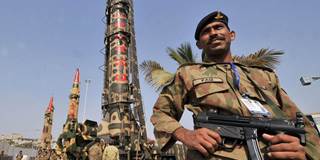The big US error after 9/11 was to treat Pakistan as if it were an ally with which it is possible to assume a large degree of policy overlap. In fact, even a more calculated, transactional relationship will not bring the US and Pakistan closer together.
NEW YORK – Harold Brown, the US defense secretary under President Jimmy Carter, was reported to have described the arms race between the United States and the Soviet Union in these terms: “When we build, they build. And when we don’t build, they build.”
From the US government’s perspective, the state of current relations with Pakistan is remarkably similar: When we support Pakistan, they do things we don’t like; and when we sanction Pakistan, they do things we don’t like.
From the Pakistani perspective, the past would be mostly a narrative of multiple betrayals, featuring a US that gets close to Pakistan for a time, only to cut off aid whenever its leaders see fit. For example, the US armed the mujahedeen who fought the Soviets in neighboring Afghanistan in the 1980s, but then all but abandoned the region soon after the Soviet military exit in 1989. Conveniently missing from this narrative is that it was Pakistan’s development of nuclear weapons in contravention of US law that necessitated the withdrawal of aid.

NEW YORK – Harold Brown, the US defense secretary under President Jimmy Carter, was reported to have described the arms race between the United States and the Soviet Union in these terms: “When we build, they build. And when we don’t build, they build.”
From the US government’s perspective, the state of current relations with Pakistan is remarkably similar: When we support Pakistan, they do things we don’t like; and when we sanction Pakistan, they do things we don’t like.
From the Pakistani perspective, the past would be mostly a narrative of multiple betrayals, featuring a US that gets close to Pakistan for a time, only to cut off aid whenever its leaders see fit. For example, the US armed the mujahedeen who fought the Soviets in neighboring Afghanistan in the 1980s, but then all but abandoned the region soon after the Soviet military exit in 1989. Conveniently missing from this narrative is that it was Pakistan’s development of nuclear weapons in contravention of US law that necessitated the withdrawal of aid.